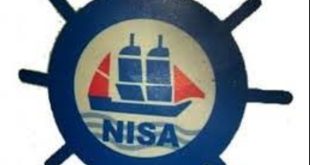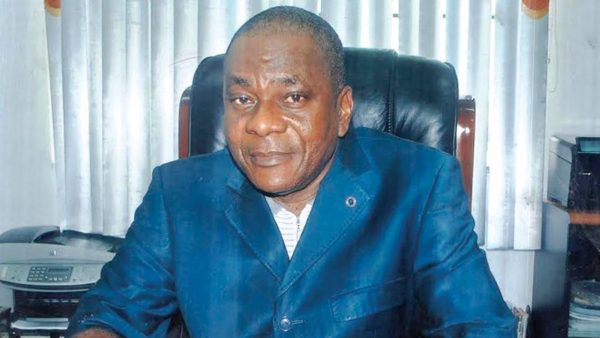-

CBN’s Building CBN’s cashless policies are contradictory – Experts
- Concessionaires to take over Onitsha river port in December
- NIMASA to acquire 2 special mission vessels
By Kenneth Jukpor
There are strong indications of emerging monetary crisis in Nigeria following Central Bank of Nigeria’s (CBN) newly introduced policies on charges for cash based transactions, as fiscal experts have highlighted factors which would coax Nigerian business operators and owners into storing monies in their homes.
It is the view of some analysts that this development will boost the informal economy which contradicts the financial inclusion policy of the government with a multiplier effect of increased tax evasion and other business regulatory compliance level.
According to research, also, informal economy is increasing with “modern and industrial growth- accounting for more than half of the new jobs in Latin America and 80%of new jobs in Africa”, presupposing that more businesses will regress to informal structure, with the policies.
While CBN’s cashless policy aims at reducing the amount of physical cash circulating in the economy and encouraging more electronic-based transactions, the numerous charges on online transactions, recent increment in Value Added Tax (VAT) from 5% to 7.5% and stamp duty charges on Point of Sale (POS) merchant’s transactions, have been highlighted as contradictory policies that negate the government’s drive to attain a cashless society.
Recall that CBN recently announced that cash transactions would attract 3% processing fees for withdrawal and 2% processing fees for lodgement of amounts above N500,000 for individual accounts. Similarly, corporate accounts would attract 5% processing fees for withdrawal and 3% processing fees for lodgement of amounts above N3 million.

Speaking with MMS Plus newspaper during an exclusive chat last week, the Managing Director of Cowry Assets Management Limited, Mr. Johnson Chukwu said that the challenge with the re-introduction of this cashless policy was that “it is coming at a time when there are other policies contradicting its purpose”
According to Johnson Chukwu, some of the policies contrary to the objective of the cashless policy are taxes levied on online transactions, the increase in VAT and the issue of stamp duty charges for merchants.
While he noted that the objective of the cashless policy was altruistic as it is supposed to help improve the economic activities in the country, he said, “Imposing taxes on online payment platforms and unbundling, taxing and imposing stamp duties on all POS merchant transactions involving N1000 and above will negate the objectives of the cashless policy which the introduction of charges is supposed to serve”
He stated that he had expected the government to show that it was encouraging a cashless environment by making online payment platforms and other alternative transaction platforms relatively cheaper so that people would be motivated to migrate from cash transactions to other methods.
“It would have been easier for people to run away from the system of carrying cash with the new charges to another platform where there aren’t too many charges. If we have charges on both ends, we are going to create confusion and we may compel business people to begin to keep their monies at home. That is the challenge we have” he stressed.
Meanwhile, the Chief Executive Officer (CEO), Quiet Dimensions Limited, Mr. Ime Udoma lamented that the policy wouldn’t help CBN or the Nigerian government in any way as it wouldn’t lead to improved cashless society.
“They shouldn’t just introduce such policy without proper consultation. Nigerians have always been known as people who prefer to trade with money rather than card transactions or online transactions. As a people, Nigerians have become comfortable with cash as it makes life easier for us,” he said.
According to Udoma, “It doesn’t make sense to charge people for doing their businesses because that is how I see it. Nigeria’s economy would have gone under long time ago if we weren’t a trading society, where everyone has his/her money”
According to him, the cash-based characteristic of the nation dissipated the effects of the recent economic recession as a large portion of money remained in circulation outside the banking system.
“Remember how Greece suffered an economic meltdown during a recession, Nigeria’s situation in the last few years was worse but what helped us was that a large portion of money remained outside the banking system,” he said.
“How do we explain to a farmer in Kano, or a businessman in Idumota or Alaba International market that we would rather transfer the money to their bank accounts? The educational level of Nigeria hasn’t got to that level; most of the people that are trading are peasants. You can’t be talking about this cashless policy right now because it hasn’t been inculcated into our culture,” Udoma added.
Investigations have shown that most Nigerians don’t derive pleasure in keeping cash but they have to do so because of the immediate needs.
“Most traders in several markets across the country have sufficient funds to go into direct importation of their products but they don’t do so because they can’t wait for that cycle of ninety days to get the items. Rather, they hold their money and buy from the containers that arrive the country. This gives them the competitive edge ahead of their peers,” a business analyst noted.
Meanwhile, the President of the Chartered Institute of Bankers of Nigeria (CIBN), Mr. Uche Olowu argued that it was a wrong impression to think that the other charges associated with online banking and POS merchant services make it an inappropriate time to introduce these charges on deposits and withdrawals.
“If you don’t meet the threshold, you cannot be charged. You cannot be charged as an individual if you don’t transact more than N500,000 a day or N3million as a corporate entity. The charges weren’t introduced to generate income but to change the monetary behavior of Nigerians,” Uche said.
Speaking on the numerous charges associated with online banking and POS transactions, he said, “People have to realize that banks deploy a lot of infrastructure for these transactions and these banks have to recoup the cost of the infrastructure to service them. It is very obvious that technology costs huge money that even when the technology is outdated, you still have to recoup that cost”
He expressed optimism that as technology infrastructure improves, the banks would be expected to incur less cost and review these charges as they pass on the cost efficiency to customers and the charges on transactions would come down.
Meanwhile, in another development, the National Inland Waterways Authority (NIWA) has revealed that concessionaires would take over the Onitsha river port by December this year.
The Acting Managing Director of NIWA, Barr. Danladi Ibrahim revealed this during an exclusive chat with MMS Plus last week during the 2019 World Maritime Day celebration with the theme, “Empowering Women in the Maritime Community” in Lagos.
“I can assure you that before December the concessionaires of the Onitsha River Port would take over” he told our correspondent.
Also speaking on the absence of activities at the much celebrated Baro port, Danladi said that the poor state of the port access roads and the absence of railway made the project unviable.
However, he assured that road construction and the railways have been contracted.
He also noted that NIWA has started sourcing for partners via Public-Private Partnerships (PPP) to enable the authority develop structures to evacuate cargoes from Lagos ports via waterways.
“We have discussed with several investors because this initiative has to be a PPP project. We have also had discussions with the Minister of Transportation and we would proceed to meet with the Infrastructure Concession Regulatory Commission (ICRC) in October” he explained.
The Minister of Transportation, Hon. Rotimi Amaechi has admonished Nigerian women to close the gap between the rich and the poor in the country even though he didn’t give any assurance of empowering the women to be better placed to carry out such tasks.
Rather than beg for more opportunities, the Minister of Transport urged women in the maritime sector to develop their capacity to enable them qualify for higher positions in their respective fields.
However, the Minister of State for Transportation, Hon. Gbemisola Saraki stressed that women were not begging. She lamented that some Nigerian men wouldn’t give women opportunities even when they deserve it on merit.
“The point we are trying to make is that everything should be on merit. We know that not all the men in these positions deserve to be there. The issue is that there are certain people in the society who are disadvantaged. There are prejudices, whether it is religion, tribe or gender. This problem exists and that’s why the International Maritime Organization (IMO) has focused on this,” she said.
Gbemisola applauded the Nigerian Shippers’ Council (NSC) which has four female Directors and eight Assistant Directors, even as she commended the Managing Director of Nigerian Ports Authority (NPA) for her exemplary leadership at the Authority.
Meanwhile, the Director General of Nigerian Maritime Administration and Safety Agency (NIMASA) Dr. Dakuku Peterside revealed that the agency was set to acquire maritime patrolling assets such as two special mission vessels and seventeen interceptors.
Dakuku explained that the special mission vessels would be able to have helicopters land on them while the seventeen interceptors are fast vessels able to operate of shallow draft and deep draft to chase pirates down creeks at high speed.
Revealing 2018 statistics on the Gulf of Guinea (GoG), Dakuku noted that 78 seafarers out of the 83 kidnapped globally were on the GoG, while 130 of the 141 global hostages and 13 of the 18 ships hijacked globally were also on the corridor.
Besides acquisition of critical maritime security assets, Dakuku expressed optimism that the nation is better placed to combat piracy with the passage of the Suppression of Piracy and other Maritime Offences bill into law.
He lamented that the absence of the legal framework to prosecute pirates and armed sea robbers was a major setback in addressing insecurity in the GoG over the years.
 MMS PLUS NG – Maritime, Aviation, Business, Oil and Gas News Online Newspaper with coverage in Maritime, Oil and Gas, Aviation, Power and Energy as well as Financial News
MMS PLUS NG – Maritime, Aviation, Business, Oil and Gas News Online Newspaper with coverage in Maritime, Oil and Gas, Aviation, Power and Energy as well as Financial News









